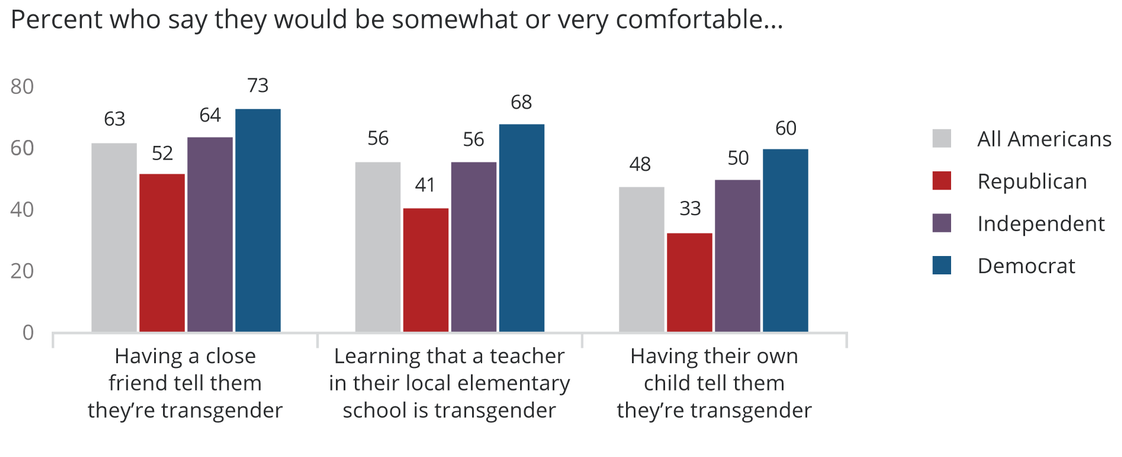Amid rollbacks of federal protections for transgender individuals, a new survey finds Americans have grown increasingly more supportive of rights for transgender people. Sixty-two percent of Americans say they have become more supportive of rights for transgender people over the last five years, compared to just 25% who say they have grown more opposed.
Despite the Trump Administration’s ban on transgender personnel joining or enlisting in the military not in their assigned gender at birth, the survey finds more than six in ten (63%) Americans, including an increasing number of Republicans (47%), Americans who view Trump favorably (47%) and majorities of almost every major religious group support transgender military service.

The nationally representative survey was conducted by PRRI, a nonpartisan research organization, among 1,100 adults between April 9 and April 20, 2019.
Increasing and Widespread Support for Transgender Rights
Support for transgender rights has grown across partisan lines with majorities of Democrats (76%) and independents (64%) and less than half Republicans (47%) saying they have become more supportive of transgender rights in the last five years. This support even crosses ideological breaks within the parties. Conservative Republicans (40%) are the only ideological group with less than half reporting increased support for transgender rights; even among this group, only 43% report they have become more opposed to transgender rights over this period.
Majorities of every major religious group report that they have become more supportive of transgender rights over the last five years. This includes religiously unaffiliated Americans (69%), Catholics (68%), nonwhite Protestants (60%), and white mainline Protestants (57%), as well as white evangelical Protestants (52%).
“This broad and growing support for transgender rights from nearly every group and across party and religious lines demonstrates just how dramatically American attitudes have shifted across the last decade,” notes PRRI CEO Robert P. Jones. “This emerging consensus of support for transgender rights and increasing comfort with transgender people, especially among more conservative groups, is a sign that we may be seeing the beginning of the end of transgender issues being used as political wedges.”
Notably, this support for transgender rights exists despite the fact that Americans are less likely to have close connections with transgender people than with gay, lesbian, or bisexual people. Just 24% of Americans report having a transgender close friend or family member. Almost half (46%) report having a bisexual close friend or family member and 68% report having a gay or lesbian close friend or family member.
Support for Transgender People Serving in the Military
Nearly two thirds (63%) of Americans today favor allowing transgender people to serve in the U.S. military. This level of support is virtually unchanged from 2017 (64%).
While overall support has remained consistent over the last two years, Republicans have grown more supportive of transgender military service, up from 37% in 2017 to 47% today. Support levels among Democrats and independents are not significantly different from 2017.
With the exception of white evangelical Protestants, majorities of every major religious group favor allowing transgender people to serve in the military, including the religiously unaffiliated (71%), white mainline Protestants (65%), Catholics (65%), and non-white Protestants (63%). White evangelical Protestants are divided (49% favor, 46% oppose).
Divisions over Use of Public Accommodations by Transgender People
Despite widespread support for transgender rights, Americans are divided over policies that would require transgender people to use bathrooms consistent with their sex assigned at birth (45% favor, 47% oppose). There is evidence that the public’s views are somewhat fluid on this issue. Since 2017, support for this policy has increased from 38% to 45%. During the same period, opposition dropped slightly from 50% to 47%, a change that is not statistically significant. These asymmetric shifts are due to the changing proportion of Americans who say they are unsure what to think about the issue (12% in 2017 vs. 8% in 2019).
“We’re seeing Americans’ attitudes towards transgender people shift rapidly,” said Jones. “While the general trends are clearly toward more support for transgender rights, there remains some fluidity and uncertainty among some Americans as their general opinions and commitments get applied to specific policies.”
Support for Transgender People in Everyday Life
Americans’ support for transgender rights is reflected in their reported comfort levels with transgender people in their everyday lives as friends, teachers, and family members.
- Transgender friends: 63% of Americans say they would be somewhat or very comfortable having a close friend tell them they are transgender. Strong majorities of Democrats (73%) and independents (64%) agree, along with a majority of Republicans (52%).
- Transgender teachers: 56% of Americans say they would be somewhat or very comfortable learning that a teacher at their local elementary school is transgender. Majorities of Democrats (68%) and independents (56%), but just 41% of Republicans, agree.
- Transgender children: Americans are divided about how comfortable they would be with their child telling them they are transgender (48% somewhat/very comfortable vs. 48% somewhat/very uncomfortable). Six in ten (60%) Democrats say they would be comfortable with their child telling them they are transgender, compared to half of (50%) independents, and one-third (33%) of Republicans.
Methodology
Results of the survey were based on bilingual (Spanish and English) RDD telephone interviews conducted between April 9 and April 20, 2019, by professional interviewers. Interviews were conducted among a random sample of 1,100 adults 18 years of age or older living in the United States (668 respondents were interviewed on a cell phone). The survey also over-sampled Texas residents (150). The margin of error for the survey is +/- 3.5 percentage points at the 95% level of confidence. The design effect for the survey is 1.39.

